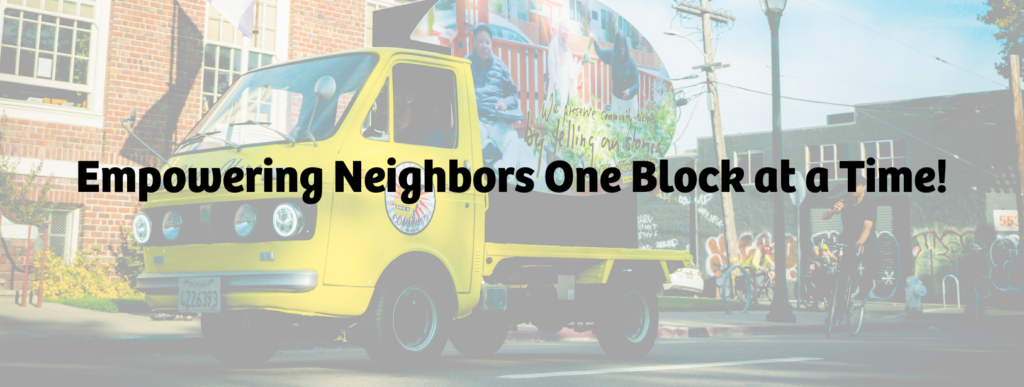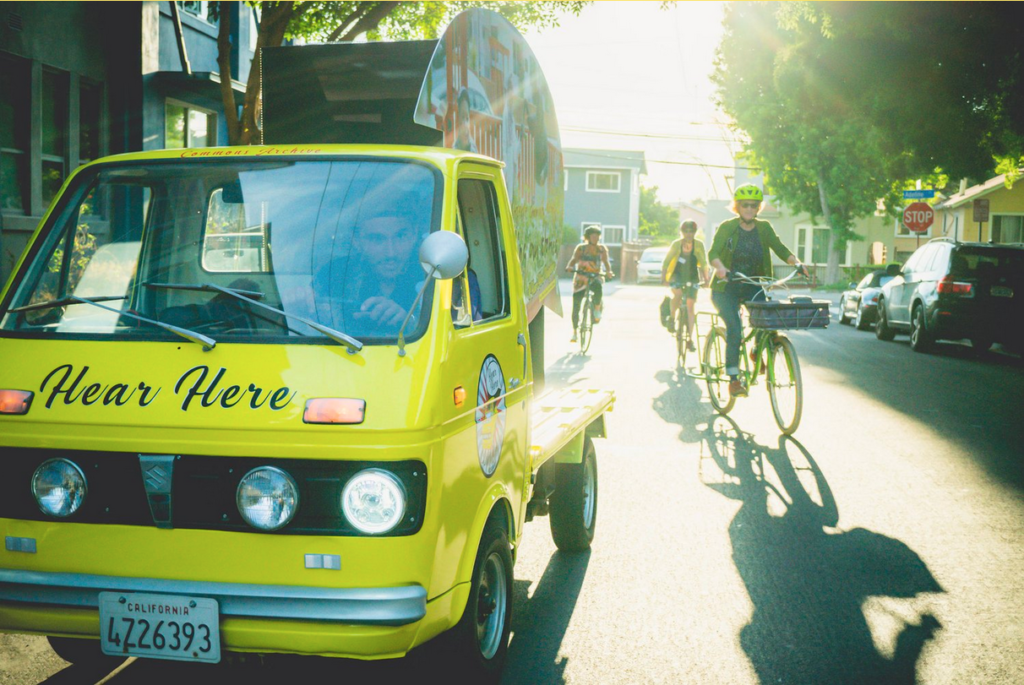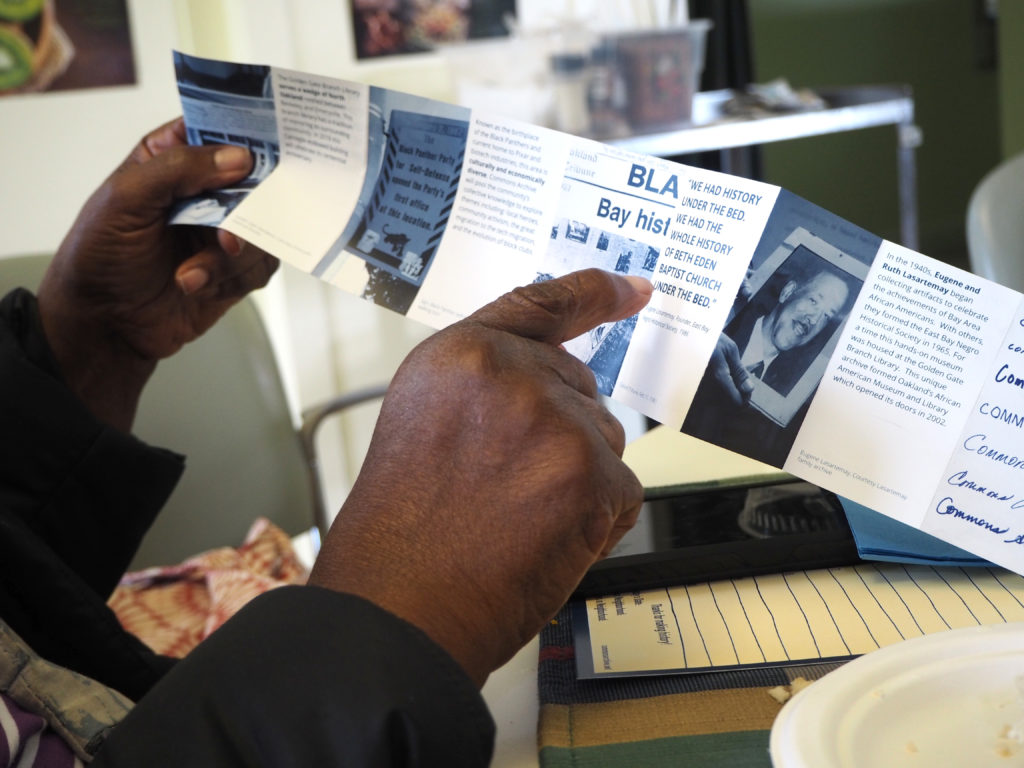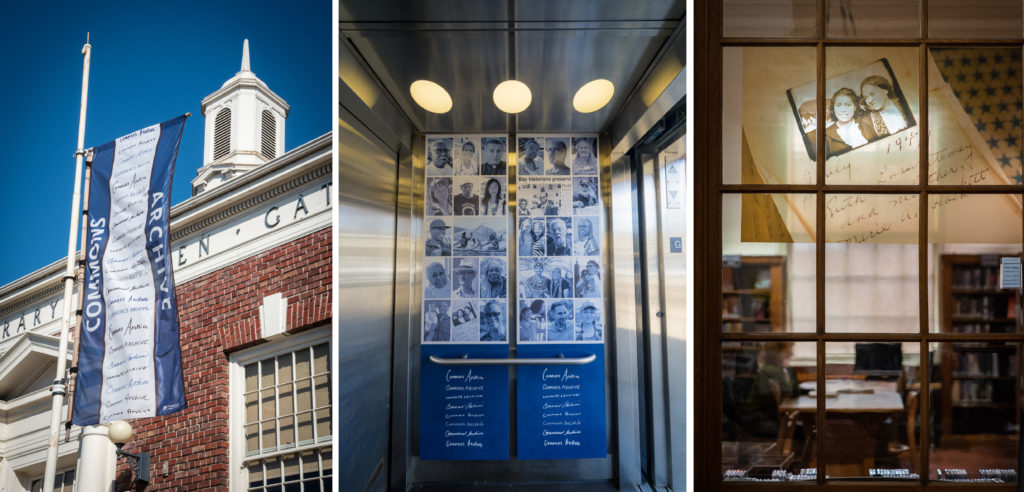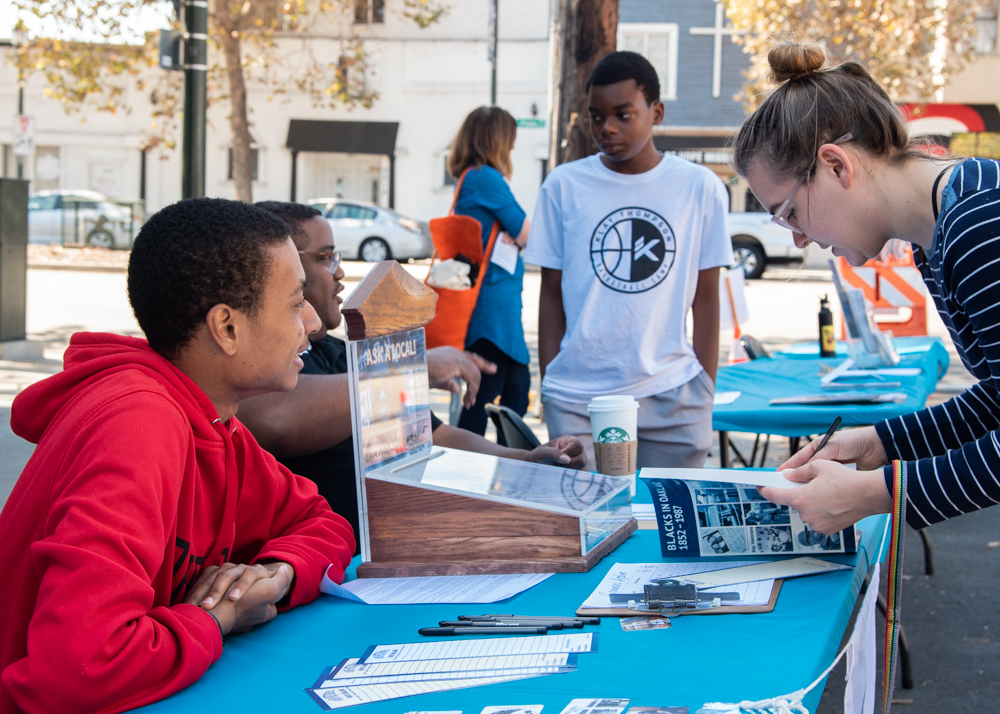Commons Archive
Read the latest news on Commons Archive’s “HEAR HERE” community billboard truck from the Kenneth Rainin Foundation – A Public Art Project Brings Oakland Neighbors Together, One Story At A Time.
Commons Archive was featured in Kenneth Rainin Foundation’s 2022 Turning Points report. Kala was grateful to be an Open Spaces grantee with Commons Archive. Click through here to see how Bay Area artists and arts organizations are creating visionary works of art and centering community.
Commons Archive is a creative grassroots history project organized by artist and cultural researcher Sue Mark of marksearch. With North Oakland community groups and the Golden Gate Branch Library, Commons Archive connects neighbors through stories, shared resources and celebrations.
In doing this deep history work, Commons Archive acknowledges and honors the Muwekma Ohlone people past and present who have settled, nurtured, and loved North Oakland and the surrounding region.
HEAR HERE Community Billboard Truck

Listen up, and look out for HEAR/HERE! – the brightest, cutest, custom EV truck on the streets of North Oakland! No matter where we find ourselves, we are each a neighbor to other people. However, living in the same place doesn’t mean we know how to live together, and our recent collective experience through a global pandemic was acutely challenging. Existing underlying community tensions are exacerbated
through necessary social distancing, fear, and distrust. As we emerge to rebuild a sense of what we once knew, how do we create better support systems for our neighborhoods?

It was during this time of COVID-induced isolation when Commons Archive, a creative, grassroots,
inter-connective, neighborhood memory project based in North Oakland, recognized the emergent
need for a reparative process. To nurture neighborhood empowerment, the Commons Archive team has
developed their latest initiative – the ‘HEAR/HERE Community Billboard Truck’.
The HEAR/HERE truck is a vintage, custom-built EV vehicle equipped with a large format digital screen, a
sound system and an eye-catching static display board. Designed for neighbors to listen and gather
stories, share memories, and promote local community gatherings, the truck encourages neighbor
interaction and understanding. Black youth activists drive the truck, engaging neighbors with questions
around belonging. Here is a link to download the full press release.
Upcoming Events
For a complete list of events in October and November 2022, click here.
Past Commons Archive Events
Hi! How Are You? – A Virtual Roundtable Conversation, Thursday, June 3, 2021, 5-6:30pm
Commons Archive is releasing the recording of our June, 2021 roundtable conversation about equity and neighbor relationships. Featuring Saturu Ned, Shikira Porter, founding member of Neighbors for Racial Justice and Commons Archive director Sue Mark along with other North Oakland activists, this conversation unpacked the challenges to create inclusive, supportive neighbor networks. Even before COVID, informal face-to-face interactions were disappearing. Timestamped video outline is available here.
We all carry stories of our neighborhoods, the stories that make a place home. Commons Archive honors the many histories of this rapidly changing North Oakland neighborhood. This starts by listening to and learning from each other.
Starting in 2013 through Print Public, Commons Archive has worked with neighborhoods surrounding Kala. Just a few blocks south, the Golden Gate neighborhood is historically working-class, shifting from predominantly Northern European to African American during The Great Migration. The birthplace of the Black Panthers, this neighborhood has experienced seismic changes. By supporting Commons Archive and other projects that animate public space, build local partnerships and deepen neighborhood ties, Kala explores ways to best serve its nearby community.
Commons Archive collaboratively explores issues like: whose knowledge is valued; connections among new and longtime neighbors; how neighborhood culture can both remain intact and evolve; ways a neighborhood becomes a community. Commons Archive uses Participatory Action Research (PAR) to empower neighbors as experts of their experiences. To learn how to live with one another, we need to share and listen to each others’ stories.
Supporting Neighborhood Mutual Aid
Commons Archive | 2020-2022 Before COVID-19, Commons Archive convened deep listening circles with local organizations to strengthen neighbor relationships & support long-term stability. Participants held family, neighbor, & community stories with care. Since we can no longer safely gather, we’re launching Block By Block to connect neighbors. Building on the legacy of block club hospitality, Block By Block shapes new pathways to share stories, resources & camaraderie. Deep listening, a key to Restorative Justice, grounds these neighborhood networks. Follow our Instagram as we roll out Block By Block!
Image Credits (L-R): Maya Curry, Longfellow Community Association, Sue Mark/marksearch
Developing a Neighborhood Literacy
Commons Archive: Golden Gate Local Collection | 2019 Publishing the Golden Gate Library Local Collection, a local reference series housed at the library, makes neighbor stories & community scholarship accessible. This non-traditional archival format centers the library as a nexus for neighborhood literacy. New & longtime neighbors can learn this neighborhood’s many histories. Looking to neighbors as keepers of stories & deep community knowledge, this collection is guided by Popular Education: everyone is a teacher & learner. We need the perspectives of everyone in our communities to nurture long-term resiliency.
Image Credits (L-R): Sue Mark/marksearch, Dianne Jones, Dianne Jones
Building Community at the Neighborhood Library
Commons Archive | 2017-2019 Using cultural organizing to support neighborhood sustainability & resiliency, Commons Archive moved into the Golden Gate Branch Library. Integrative installations, from the front lawn to the elevator & hallways, welcomes & invites neighbors to engage with the project. Participatory practices from earlier project phases are deeply embedded in Commons Archive. Recurring block-party celebrations & community-led workshops bring neighbors together to make connections, share stories, enjoy local food & neighborhood music. These experiences are opportunities to deepen relationships among community-based organizations, neighborhood groups, & residents.
Image Credits (L-R): Douglas Zimmerman, Douglas Zimmerman, Ellen Lake
Honoring Neighborhood History Keepers
Commons Archive: The Lasartemays | 2016 In the mid-1940s Eugene & Ruth Lasartemay began collecting community artifacts to honor Bay Area African Americans. Their groundbreaking work led to the creation of the East Bay Negro Historical Society (EBNHS). Their storefront museums & Golden Gate Library presence (1980s) hugely influenced Commons Archive. Using family materials donated by the Lasartemays’ grandson, marksearch designed an immersive research room at Kala. An active space to unpack, annotate, & hold events, the installation made visible the underknown connections among the Lasartemays, EBNHS, the Golden Gate Library & the African American Museum & Library at Oakland.
Image Credits (L-R): Sue Mark/marksearch
Amplifying Neighbor Voices
Communities’ Crossing | 2014-2015 Communities’ Crossing recorded neighbors’ stories to create on-the-street performances at the library, the local farmers’ market & sidewalks in between. Thematic neighbor-led walking discussions also brought history to many. Stopping by homes & community landmarks, neighbors shared knowledge, skills & experiences. A video compilation of interviews with both new & long-time neighbors centered the reflections of those most impacted by changes in the Golden Gate neighborhood. An interactive installation at Kala housed performance props: screen-printed signs, banners, & interview transcripts.
Image Credits (L-R): Lorah Gross, Pamela Palma, Dianne Jones
Making Neighborhood History Accessible

Finding Klinkner | 2013-2014 Starting in 2012, realtors’ began the controversial rebranding this historically Black area as “NOBE” (North Oakland, Berkeley, Emeryville). Sparked by these gentrification debates, Finding Klinkner shared research about the Golden Gate’s early roots when an 1880s maverick real estate developer did the very same thing. Research from the Oakland History Center was translated into 2000 interpretive letterpress bookmarks randomly distributed in the Golden Gate Library’s collection. So began a long relationship among Sue, library staff, local residents and community groups to develop novel approaches to neighborhood history.
Image Credits (L-R): Pamela Palma, Pamela Palma, Gene Anderson
Commons Archive has been made possible due to the support of many neighbors, community organizations, and generous funders.
Community Groups & Organizations

Funders


